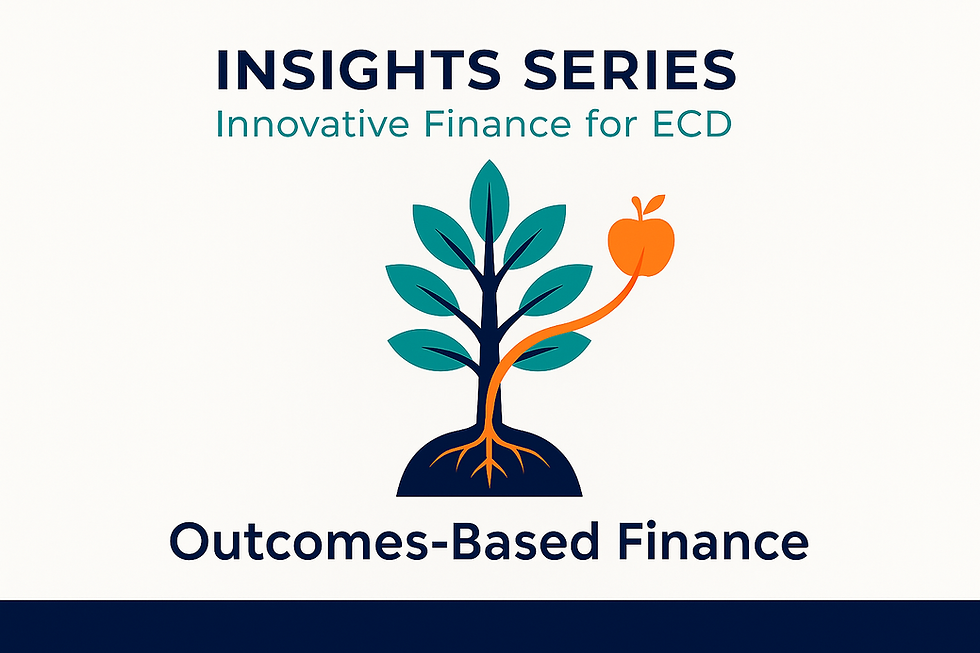Building OBF4ECCE Version 2.0 Together
- Nov 21, 2024
- 3 min read
Updated: Nov 4, 2025
New evidence review sheds light on insights from past programmes and shows next steps to leverage OBF for ECCE
Governments and philanthropic organisations are increasingly recognising the critical role Early Childhood Care and Education (ECCE) plays in preparing children for school and laying the foundation for lifelong learning. With this growing acknowledgment comes a challenge—limited public resources for education must stretch across a growing population and an increasing demand at all levels of education. To meet this challenge, partnerships with the private sector and philanthropic organisations are essential for scaling ECCE effectively.
Outcomes-Based Financing (OBF) models offer one promising avenue to drive innovation and impact in ECCE at scale. By linking funding to measurable outcomes, OBF mechanisms offer an exciting way to align incentives and focus on results, rather than simply funding inputs. At the Education Outcomes Fund, we are leveraging OBF to explore how it can effectively scale high-quality ECCE. In collaboration with our government partners and the LEGO Foundation, we are working to implement this approach for ECCE programmes in Rwanda, Sierra Leone and South Africa (see footnote 1).
Our current initiative is part of a larger movement—over the past decade, more than twenty ECCE programmes have adopted OBF models. Despite this progress, a comprehensive synthesis of the lessons learned from these efforts has been noticeably absent. This lack of consolidated knowledge led us to reflect on the gaps that still exist. What key areas remain under-explored? And how can we better prioritise our contributions to advance the conversation on ECCE and OBF?
This is why we are thrilled to welcome the newly released evidence review prepared by the Government Outcomes Lab, NORRAG, and Ecorys in partnership with EOF. These organisations co-lead the Collective Learning Initiative (CLI), a peer-to-peer learning opportunity dedicated to advancing knowledge in OBF4ECCE.
This comprehensive review synthesises insights from 105 documents using a meticulously designed coding framework that examines an astounding 91 variables. The report complements this data with first-hand insights from interviews and group discussions with OBF and ECCE practitioners. In essence, this document is set to be a cornerstone for anyone interested in working at the intersection of OBF and ECCE.
For us at EOF, the key takeaway from this review is clear: we must be more intentional in contributing to evidence generation. By sharing the learnings from our early-stage engagements, design decisions and implementation experiences, as well as programme outcomes, we can help turn the evidence "heat map" from red to green. This commitment to reflection and open learning will be critical not only during programme implementation but also in examining long-term results beyond the three programmes’ completion.
As EOF, we remain dedicated to our internal learning efforts and to sharing our findings with the broader community. Moving forward, we will continue collaborating with fellow practitioners, participating in collective discussions, and reflecting on our shared challenges. Whether you are a seasoned expert or just beginning your journey with OBF and ECCE, we look forward to walking alongside you as we continue to generate and share knowledge to build OBF4ECCE Version 2.0 together.

This blog was written by Dr. Özsel Beleli, Head of Learning and Engagement, ECCE at EOF. We invite you to stay tuned as this conversation unfolds, our shared insights grow, and we collectively strive to create more impactful ECCE programmes that deliver better outcomes for young children. For further information on EOF's work in early childhood care and education, please contact Dr. Özsel Beleli at ozsel@edufundmea.org. Footnotes
The Rwanda ECCE Outcomes Fund is funded by the Government of Rwanda and the LEGO Foundation; The Sierra Leone ECCE Outcomes Fund is funded by the Government of Sierra Leone, the Danish Ministry of Foreign Affairs and the LEGO Foundation; The South Africa ECCE Outcomes Fund is funded by the Government of South Africa, First Rand, the LEGO Foundation, Oppenheimer Memorial Trust, Standard Bank and Yellowwoods.
At EOF we're exploring using AI to create audio versions of our publications.
Try out this tool and let us know what you’re using – we’re always looking for
ideas on increasing accessibility.





Comments